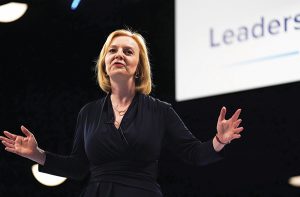Bloomberg
Liz Truss vowed to slash “waste, bureaucracy and inefficiency†in the civil service to save billions of pounds a year for the British taxpayer if she becomes UK prime minister.
The foreign secretary, the front-runner in the race with Rishi Sunak to succeed Boris Johnson, said that she’ll align the pay of public sector workers to living costs in the regions where they live. She also pledged to slash holiday allowances and cut diversity officers in the civil service, according to a statement from her campaign.
The anti-waste measures — which Truss said would save £11 billion ($13.5 billion) a year — are designed to shore up her support on the right of the ruling Conservative Party on the day ballot papers were sent out to party members. She’s vying with Sunak for their votes, and has presented herself as the low-tax candidate who’ll challenge the “orthodoxy†within the civil service, in particular the Treasury.
But while Truss’s campaign won a boost late Monday when she received the endorsement of former leadership rival Penny Mordaunt, her latest policy prompted concern from Conservative Members of Parliament who said it would result in a loss of investment in rural and regional economies — a reversal of the current Tory government’s election promise to “level up†economic opportunity across the country.
Steve Double, an MP representing a district in southwestern England, tweeted that it was a “terrible idea†and “hugely damaging to public services in Cornwall†where he said the National Health Service already struggles to recruit staff. Another MP from the region, Gary Streeter, called Truss’s proposals “disastrous,†while James Cartlidge, who represents a constituency in eastern England, questioned whether it meant police officers and the military in his area would earn less than those in London. Ben Houchen, the influential Tory mayor for the Tees Valley in northeast England, said on Twitter that he was “actually speechless.â€
Truss’s campaign estimated the regional pay policy could eventually save £8.8 billion a year by using regional pay boards to set public sector salaries taking into account the cost of living in their areas. The policy would only apply to new contracts, and would be carried out in consultation with unions and workers, according to the statement.
The opposition Labour Party condemned the plan, saying it amounted to leveling down. Truss is “promising a race to the bottom on public sector workers’ pay and rights,†Labour Deputy Leader Angela Rayner said in a statement. “Her ‘tailored’ pay plans would level down the pay of Northerners, worsening the divide which already exists. This out-of-touch government’s commitment to leveling up is dead.â€
 The Gulf Time Newspaper One of the finest business newspapers in the UAE brought to you by our professional writers and editors.
The Gulf Time Newspaper One of the finest business newspapers in the UAE brought to you by our professional writers and editors.
